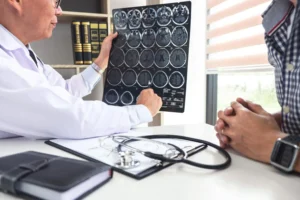Concussion Treatment: Getting the Right Care for Your Brain
A head injury can happen in a split second – whether from a sports collision, a car accident, or a simple fall. When that injury results in a concussion, it’s critical to seek timely and professional care.

What Is a Concussion and Why It Shouldn’t Be Ignored

What makes MTBIs tricky is that their effects aren’t always obvious right away. Symptoms may take hours or days to appear. This is why paying attention to how you feel after a head injury is so important. Left untreated, a MTBI can lead to complications like post-concussion syndrome. In this condition, symptoms linger for weeks or months. In rare cases, repeated MTBIs can contribute to more severe long-term brain issues.
Is there any good news? Early diagnosis of signs of a concussion and proper treatment can make a huge difference. By seeking medical advice soon after a head injury, you can confirm whether it’s a MTBI and begin the healing process. Healthcare providers typically address concussions by:
So, what is a concussion? In simple terms, it’s a type of traumatic brain injury caused by a blow or jolt to the head. This causes the brain to move rapidly inside the skull. This sudden movement can bruise or temporarily disrupt the brain, affecting how it functions. Concussions are often classified as “mild.” However, this label can be misleading. A MTBI is still a serious condition that demands attention. Ignoring it can lead to prolonged recovery or even lasting problems. Those include difficulties with memory, mood swings, or trouble concentrating.
MTBI can occur in a wide range of situations. Athletes are at risk during high-impact sports like football, hockey, or soccer, where collisions are common. Everyday situations like traffic accidents, falls on icy sidewalks, or even bumping your head on a low doorway can all cause a MTBI. Children, adults, and seniors are all vulnerable. And the trauma doesn’t always require a dramatic event. Sometimes a seemingly minor hit is enough.
- Thoroughly assessing symptoms and identifying subtle signs, like cognitive changes or balance issues.
- Recommending appropriate rest periods tailored to your symptoms and lifestyle.
- Providing a structured plan that minimizes risks and ensures a gradual return to work, school, or sports.
- Monitoring for complications such as post-concussion syndrome to prevent prolonged symptoms.
Acting quickly not only speeds up recovery. It also helps prevent setbacks. If you or someone you know has taken a hit to the head, don’t put it off until later. Reach out to our doctor to ensure your brain gets the care it needs.
Recognizing the Signs and Symptoms of a Concussion
One of the trickiest things about MTBIs is that their symptoms don’t always show up right away. Concussion symptoms can appear immediately after a head injury or develop over hours or even days. Knowing what to look for is essential. Recognizing these symptoms is crucial because ignoring them can delay recovery. Here are some common signs of a MTBI to watch for:
- Headache or pressure in the head. This is often the most reported symptom and can range from mild to severe.
- Dizziness or balance problems. Feeling unsteady or lightheaded is a red flag.
- Confusion or feeling “foggy”. Trouble focusing or feeling mentally sluggish can indicate a MTBI.
- Nausea or vomiting. These are especially common soon after the injury.
- Sensitivity to light or noise. Bright lights or loud sounds may feel overwhelming.
- Memory issues. Difficulty remembering events before or after the injury is a key sign.
- Fatigue or sleep problems. Feeling unusually tired or struggling to sleep can occur.
- Mood changes. Irritability, anxiety, or sadness may surface unexpectedly.

If you or someone else experiences any of these symptoms after a head injury, don’t wait to seek medical attention. Even mild symptoms can signal a concussion. And early detection is crucial for effective treatment. Keep in mind that symptoms can vary from person to person. And children or teens may describe them differently than adults. When in doubt, consult a healthcare professional to evaluate the situation.
